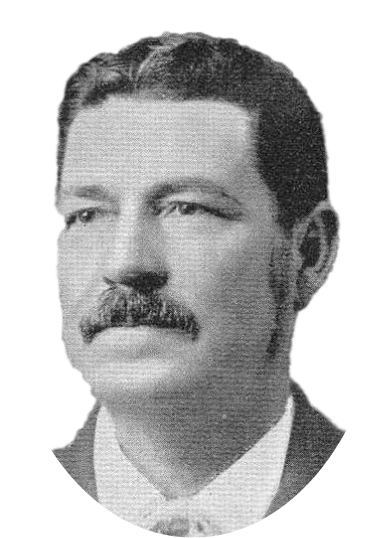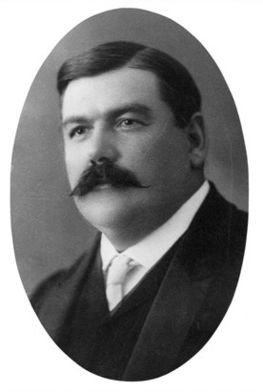More Bacon
There appears to have been a few attempts to produce bacon in Katanning, including an ill-fated bacon factory in 1917. The following story appeared in the 17 November 1906 edition of the Western Mail (Perth) where a splendid collection of bacon was shown by Mr. C. F. Wanke at the Katanning Show.
Note: The photos were added by the Lost Katanning editor.
THE KATANNING SHOW.
A PROGRESSIVE DISTRICT.
(By “Cornstalk.”)
Click here for BACON section:

.
The animal show of the Great Southern Agricultural and Pastoral Association, which is held at Katanning, is always well patronised by visitors. This is largely due to the efforts of the energetic member for the district, Mr. F.H. Piesse, who as show time approaches tries to induce all and sundry to take a trip to Katanning to see the show.

Mr F. H. Piesse
This year proved no exception to the rule, and the special train which left Perth at 11 p.m. the night before the show was well filled with visitors; in fact, more so than any of the special trains which have been run to several of the country shows this season. The train made good time, and landed visitors at Katanning at about 10 o’clock the following morning, and leaving again at midnight, landed its passengers in Perth at 10 o’clock on Wednesday, the journey of 600 miles and a day and evening at Katanning being carried out in 35 hours – a very creditable performance.
Attached to this special train was a so-called sleeping car, but the man who slept in it except when the train stopped could sleep anywhere. Whether the springs were not made for fast running, or from some other cause, the car rolled and pitched about as much as it was possible for it to do and keep on the rails. Anyone waking up after a short doze would have vivid recollections of crossing the Australian Bight in a gale of wind. At times it was necessary to hold on to remain in one’s bunk. On the return journey the following night many of the visitors looked for seats in other parts of the train, and many found them and slept in peace.
On arrival at Katanning as many of the visitors as could be accommodated with seats were taken for a drive round the district and shown some of the land which under favourable circumstances can produce excellent crops. Owing to the excessive wet weather experienced during the winter months, and then a sudden spell of dry weather being experienced just at a critical period in the growth of the wheat crops, the crops at Katanning, as well as all districts southward from Narrogin, have suffered severely, and on show morning promised to be much below the average. However, the welcome rain which fell during the afternoon may do much to improve the later sown crops and will add a good many thousand bushels of grain to the crops of this district.

Sir Newton Moore
Premier of Western Australia
1906 to 1910
The after-dinner speeches on the show day brought out some interesting facts in connection with the progress made by Katanning. The Premier (Sir Newton Moore ed.) stated that 17 years ago, when surveying, he had driven the first peg in marking out the townsite, while the member for the district, Mr. F. H. Piesse, stated that one week afterwards, when the surveyors had left, he pitched his camp on the townsite and thus became the first resident. He took up land, put men to work, and has been connected with the district ever since.
Comparing those statements of what Katanning was 17 years ago, and what it is to-day, is interesting when we consider that the progress has been entirely due to agricultural settlement. There has been no mining industry, no timber mills, or anything to afford employment, except the agricultural industry. To-day the town is one of the busiest in the State, and the business transacted will compare favourably with many of the much older towns.
The hotels, stores, and business establishments have a solid and business-like appearance. The land within a reasonable distance of the line is all taken up, and a very large proportion of it has been cleared and placed under crop. The railway now being constructed from Katanning to Kojonup, is now well inland, and will, it is anticipated, be opened in time to convey this season’s wheat crop to market, and should prove another factor in increasing the prosperity of the district, as it will make it profitable to grow wheat over a much larger area where the question of carting has been much to the disadvantage of farmers.
At Kojonup, where the line will terminate for the present, there is some excellent wheat-growing country, also to the west of Kojonup there is a large area of land which can now be put under wheat. Given a favourable season or two and we shall be loading wheat at Albany for shipment to the world’s market, and if reasonable care is taken in grading the grain West Australian wheat on account of its plumpness and colour will always hold a high place for quality.
The Premier and the Minister for Agriculture made the journey across from Donnybrook to Katanning, arriving there on show day, and stated that they passed through good country nearly all the way across. A railway connecting Kojonup with some spot on the Bridgetown line would open up and make available a large area of first-class country.
The Show was opened by the Premier at 1 p.m., and an inspection of the exhibits showed that the horses shown were above the average of past seasons; some very fine animals were exhibited. In the cattle section there were a good number of entries, but in this section, there is plenty of room for improvement. Many of the animals appeared to have been brought straight out of the paddock to the show ring, and under these circumstances, however good au animal may be, he cannot compete against one who has been put into condition for the show. Good condition in a beast covers many defects, and a well fed and groomed animal will often beat a much superior animal in a pool and ill-kept condition.
The sheep pens were fairly well filled, and some high-class animals were exhibited. In the opinion of many judges the country in this district is admirably adapted for sheep-breeding, the number of sheep kept is rapidly increasing, and the sheep-breeding industry will soon become an important one. The nearness of Katanning to Albany, about 100 miles (161 kms), will place this district in almost as good a position for shipping iambs as the breeders in the Eastern districts are to Fremantle, and there will be no excessive railway freights to pay.
.
There were very few exhibits in the pig section, but this was compensated for by a splendid collection of bacon, shown by Mr. C. F. Wanke. This bacon was of a high quality, and obtained both first and second prizes, and it would be hard to beat it at any country show. Perhaps all the pigs have been turned into bacon, and consequently there were none to enter. Mr. Wanke should have no difficulty in disposing of all the bacon that he can make.
In the farm section, the exhibits of grain were one of the features of the show, some half-a-dozen samples of wheat were entered, all very even samples; the principal feature about them being the heavy weights per bushel. The wheat which obtained First Prize weighed 66lb. (30kg) per bushel. This is a weight which is very much ahead of the f.a.q. sample of the State and shows that the wheat grown at Katanning is of a high standard. The other samples went 65lb. (29.5kg), 63lb. (28.5kg), 631b., 62lb. (28kg), and 61lb. (27.6kg), all of them being heavier than the grains shown in the Eastern districts this season.
At Katanning Show last year the wheats were also very heavy. A series of inquiries as to whether the wheats raised in this district do weigh heavier than those in the Eastern and Northern districts would be interesting, or whether the heavy weights are only due to the excellent manner in which the samples of wheat shown were graded and cleaned before being shown. The well-known firm of Messrs. F. and C. Piesse secured both first and second prizes for wheat.
An excellent sample of malting barley was shown by Mr. H. J. Beeck, who secured the prize for barley as well as for oats. There was a fair competition in the vegetable sections, the exhibits being of a fair quality; a large number of the prizes being taken by Mr. H. J. Beeck.
Those who attended the National shows held in Perth some four or five years ago will remember the splendid collection of farm produce shown by Mr. R. Beeck, of Katanning, for which he was awarded a medal. The collection was much admired at the time., as it contained such a number of articles made on the farm. Mr. Beeck was at Katanning Show. His sons, who now carry on the farm, had a large number of entries, and were successful in securing many prizes. A prize was offered for the best collection of grasses, but there were no entries; this was to be regretted, as there has been a good deal of grass seed planted in the district and an exhibit of grasses grown in the locality would have been both interesting and instructive.


Gold-Medal Butter.
The gold medal given by Mr. Wesley Maley [2] for the best 14lb (6.3kg). of fresh butter in 1lb. (.45kg) pats, brought in several entries, which the judge stilted were all of good quality.
The industrial and cookery sections contained a large number of entries. Altogether the pavilion was well filled with exhibits, but anyone visiting the show with the idea of ascertaining what the district is capable of producing would be very disappointed, as the exhibit of farm produce and vegetables was not representative of the best the district can produce, and to take into consideration the few entries in these sections, one would imagine that there were very few farms in the district, instead of which the greater portion of the land is taken up and under crop.
There were no prizes offered in the fruit section. Although the show ground is almost in the centre of a large orchard, the fruit trees were mostly in blossom and consequently there was no exhibit of apples, which do well in this and the surrounding district, and is one of the exhibits which a visitor would expect to see. A small collection of dried fruits were shown, but only on a small scale.
About 4 p.m. the storm which bad been threatening all day broke forth with a heavy peal of thunder, and the rain commenced. Everyone ran for shelter, and the events in the ring had to be postponed. The pavilion and other sheltered places were packed with ladies who had ventured out in their light summer clothes for the day. After waiting for an hour or so for the rain to cease, people began to make a run for the town in ones and twos, and with clinging dresses and wet sunshades, looked very different to what they did in the morning.
Although it spoilt the show, the rain was welcomed, as it was badly wanted, and did more good for the district than several shows would have done. Consequently, local people took a drenching with good grace, and would not have minded if it had been more. The rain continued until about 9 p.m., when it slackened. This welcome rain will save many of the crops which were beginning to suffer severely from the dry weather.
In the evening the visitors and judges were entertained at a banquet, at which for a period of three hours the speeches of politicians were listened to with interest. At midnight the special train started for Perth with most of the visitors, who had, all things considered, spent a profitable and instructive day.
Go to BACON FACTORY Page
Return to HOME Page
MORE BACON
More bacon. More bacon. More bacon. More bacon. More bacon. More bacon. More bacon.

Comments are closed.